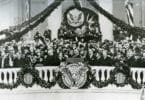Early Life and Background
Ulysses S. Grant was born as Hiram Ulysses Grant on April 27, 1822, in Point Pleasant, Ohio. He was the eldest of six children born to Jesse Root Grant, a tanner and businessman, and Hannah Simpson Grant. The Grant family moved to Georgetown, Ohio, when Ulysses was a toddler, where he spent much of his childhood.
Grant’s early life was relatively uneventful, marked by a love for horses and a distaste for his father’s tannery business. His father arranged for his appointment to the United States Military Academy at West Point in 1839. Due to an error in the nomination, his name was listed as Ulysses S. Grant, a name he decided to keep. Grant graduated from West Point in 1843, ranking 21st in a class of 39.
Military Career and Early Struggles
After graduating from West Point, Grant was assigned to the 4th U.S. Infantry and stationed at various posts. He served with distinction during the Mexican-American War (1846-1848), where he learned valuable military tactics and developed a reputation for bravery. Despite his service, Grant was disillusioned with the peacetime army and struggled with bouts of loneliness and heavy drinking.
In 1848, Grant married Julia Dent, the daughter of a prominent Missouri planter. The couple had four children: Frederick, Ulysses Jr., Ellen, and Jesse. Julia’s unwavering support and strong family bonds were significant sources of strength for Grant throughout his life.
After the Mexican-American War, Grant was stationed in remote posts in California and the Oregon Territory, where he struggled with isolation and alcohol. He resigned from the army in 1854 and returned to civilian life, facing several business failures and financial difficulties.
Civil War and Rise to Prominence
When the Civil War broke out in 1861, Grant rejoined the army and quickly rose through the ranks due to his leadership and military prowess. He achieved significant victories at Fort Donelson and the Battle of Shiloh, which brought him to national prominence. President Abraham Lincoln recognized Grant’s strategic brilliance and appointed him commander of the Union armies in 1864.
Grant’s military campaigns, including the Siege of Vicksburg and the Overland Campaign, were crucial in weakening the Confederacy. His relentless strategy of total war and coordinated offensives ultimately led to the surrender of Confederate General Robert E. Lee at Appomattox Court House on April 9, 1865. Grant’s leadership during the Civil War cemented his reputation as one of America’s greatest military commanders.
Path to the Presidency
Grant’s popularity as a war hero made him a natural candidate for the presidency. In 1868, he was nominated by the Republican Party and won the election, becoming the eighteenth President of the United States. His campaign slogan, “Let us have peace,” reflected his desire to heal the nation’s wounds and promote reconciliation.
Presidency (1869-1877)
Reconstruction and Civil Rights
Grant’s presidency occurred during the tumultuous Reconstruction era, as the nation sought to rebuild and integrate the Southern states after the Civil War. He supported the Reconstruction Acts and worked to protect the rights of newly freed African Americans. Grant’s administration passed significant legislation, including the Fifteenth Amendment, which guaranteed voting rights regardless of race, and the Civil Rights Act of 1875, which aimed to combat racial discrimination.
Grant also took a strong stance against the Ku Klux Klan and other white supremacist groups, using federal power to suppress their violent activities and protect African Americans. His administration’s efforts, however, faced resistance and were only partially successful in achieving lasting change.
Economic Policies and Challenges
Grant’s presidency faced significant economic challenges, including the Panic of 1873, a severe financial crisis that led to a prolonged economic depression. His administration struggled to respond effectively to the crisis, and Grant’s support for a hard money policy (backing currency with gold) was controversial.
Despite economic difficulties, Grant’s administration made efforts to modernize the economy and expand infrastructure. The completion of the Transcontinental Railroad in 1869, which connected the East and West coasts, was a significant milestone in American economic development.
Scandals and Corruption
One of the major criticisms of Grant’s presidency was the prevalence of corruption and scandals within his administration. Several high-profile scandals, including the Crédit Mobilier scandal and the Whiskey Ring, involved government officials and tarnished Grant’s reputation. Although Grant was not personally implicated, his loyalty to corrupt associates and failure to effectively address the scandals damaged his legacy.
Personal Life and Character
Grant’s personal life was marked by his close relationship with his wife, Julia, and their children. Julia was a steadfast partner, providing emotional support and stability throughout Grant’s military and political careers. Their marriage was characterized by deep mutual affection and respect.
Grant’s character was shaped by his resilience, humility, and determination. Despite facing numerous setbacks and challenges, he remained committed to his principles and responsibilities. His military leadership was defined by strategic brilliance and an ability to inspire loyalty among his troops.
Post-Presidency
After leaving the White House in 1877, Grant embarked on a world tour with his wife, visiting Europe, Asia, and Africa. The tour was a grand success, and Grant was warmly received by leaders and citizens of various countries.
Upon returning to the United States, Grant faced financial difficulties due to a failed investment in a banking firm. To provide for his family, he began writing his memoirs, which were published by his friend and author Mark Twain. “Personal Memoirs of U.S. Grant” became a critical and commercial success, securing his family’s financial future. Grant completed the memoirs just days before his death from throat cancer on July 23, 1885.
Legacy and Impact
Ulysses S. Grant’s legacy is a complex one, marked by his extraordinary achievements as a military leader and the challenges and controversies of his presidency. As a general, Grant’s leadership and strategy were instrumental in preserving the Union and ending the Civil War. His efforts during Reconstruction, while facing significant obstacles, demonstrated his commitment to civil rights and national reconciliation.
Grant’s presidency was marred by economic difficulties and corruption scandals, which overshadowed some of his accomplishments. However, his dedication to public service and his contributions to American history remain significant. His memoirs, considered one of the finest works of military literature, offer valuable insights into his life and times.
Interesting Aspects of Grant’s Presidency
Support for Native American Rights
Grant’s administration made notable efforts to reform Indian policy and promote peace with Native American tribes. He appointed Ely S. Parker, a Seneca chief, as Commissioner of Indian Affairs, making him the first Native American to hold the position. Grant’s “Peace Policy” aimed to reduce conflicts and improve conditions on reservations, although its success was limited by implementation challenges and resistance from settlers and politicians.
Efforts to Combat Anti-Semitism
Grant took significant steps to address anti-Semitism during his presidency. In 1862, as a general, he issued General Order No. 11, which expelled Jews from certain areas under his command. Grant later expressed regret for the order, and as president, he appointed Jews to prominent positions and took action to protect their rights, including intervening to stop the persecution of Jews in Romania.
Conclusion
Ulysses S. Grant’s life and presidency represent a remarkable journey from humble beginnings to the highest levels of military and political leadership. His contributions to preserving the Union, advancing civil rights, and promoting national reconciliation are enduring aspects of his legacy. Despite the challenges and controversies of his presidency, Grant’s character, resilience, and dedication to public service remain influential.
Grant’s story is a testament to the complexities and challenges of leadership during a transformative period in American history. His achievements and struggles offer valuable lessons and continue to inspire future generations.
Recommended Books on Ulysses S. Grant
This comprehensive biography by Ron Chernow offers a detailed and nuanced portrait of Grant’s life, from his early years and military career to his presidency and beyond.
“The Personal Memoirs of Ulysses S. Grant” by Ulysses S. Grant
Grant’s memoirs, considered one of the greatest works of military literature, provide an insightful and engaging account of his life and times.
“American Ulysses: A Life of Ulysses S. Grant” by Ronald C. White
This biography by Ronald C. White explores Grant’s character, leadership, and contributions to American history, offering a fresh perspective on his legacy.
“Ulysses S. Grant: Triumph Over Adversity, 1822-1865” by Brooks D. Simpson
Brooks D. Simpson’s biography focuses on Grant’s early life and military career, highlighting his resilience and achievements before becoming president.
“Grant and Twain: The Story of an American Friendship” by Mark Perry
This book explores the friendship between Grant and author Mark Twain, particularly their collaboration on Grant’s memoirs, providing a unique look at Grant’s later years.






